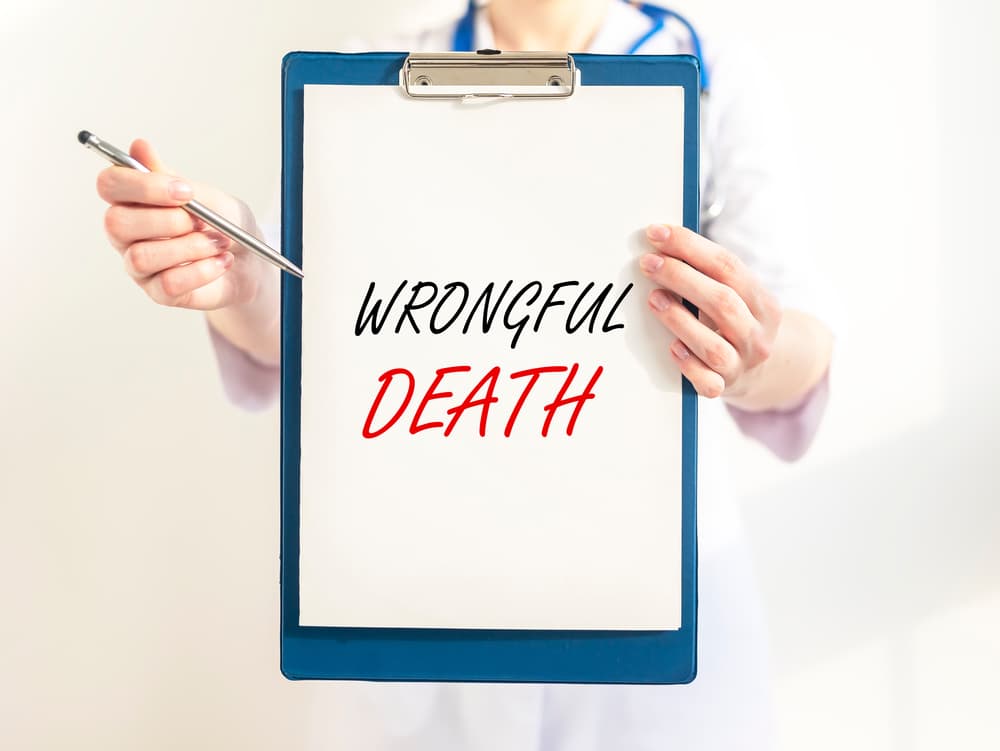Wrongful death happens when someone passes away because of negligence—when someone does not take reasonable steps to prevent harm to another person, they are negligent—we will explore this in more detail shortly.
If your loved one passed away for reasons other than natural causes (and perhaps even then), you should consider whether the death was wrongful. The right wrongful death attorney can explain whether your loved one’s passing qualifies as a wrongful death. If it does, you are entitled to pursue compensation from liable parties.
Wrongful Death Cases Usually Involve Negligence
Negligence is the failure of someone or some organization to honor their duty of care. A duty of care requires that someone acts as a reasonable person would act in the same circumstances.
An attorney proves negligence by:
- Establishing the liable party’s duty of care: A duty of care requires that someone acts in a reasonable way. Reasonable behavior includes preventing harm from others.
- Establishing a breach of duty of care: If someone acts unreasonably, they breach their duty of care.
- Proving that the breach of duty of care caused harm: When someone’s unreasonable actions harm another person, the victim can seek compensation for the injury or wrongful death. Your attorney will tie the defendant’s negligence to the resulting harm.
- Establishing the damages resulting from the breach of duty of care: First, your attorney will prove duty of care, breach of duty of care, and causation. Next, they will explain the harm you have suffered because of the defendant’s negligence.
Wrongful death lawyers use this general framework but tie their client’s case details into the blueprint for proving negligence. For example, your lawyer may cite a defendant’s drunk driving when proving the breach of duty of care.
Examples of Negligence That Can Cause a Wrongful Death
To understand negligence further, consider specific examples of negligence that can cause a wrongful death, including:
- A driver running a red light
- A boat driver speeding near swimmers
- A product manufacturer failing to conduct adequate safety testing
- An owner failing to fix a dilapidated property (which may include tripping and slipping hazards)
- A doctor failing to conduct all necessary testing (and failing to properly diagnose a fatal condition as a consequence)
- A property owner failing to hire a security guard, allowing a physical attack to occur as a consequence
- An owner failing to keep an aggressive dog on a leash
These are a handful of examples of negligence. When someone’s behavior strikes you as careless, inadequate, or reckless, that behavior may qualify as negligence. An experienced wrongful death lawyer can confirm that negligence caused your loved one’s passing.
Common Wrongful Death Cases That Lead to Lawsuit
A virtually endless number of circumstances can cause a wrongful death, so always consider if someone could have prevented a loved one’s passing.
Law firms see several common types of wrongful death cases, including:
- Car accidents
- Truck accidents
- Motorcycle accidents
- Pedestrian accidents
- Boating accidents
- Airline and plane accidents
- Medical malpractice (including surgical errors, missed diagnoses, delayed diagnosis, and birth injuries)
- Abuse and neglect (including of nursing home residents and others who cannot care for themselves)
- Slip and falls
- Trip and falls
- Accidents resulting from dangerous premises (such as electrocutions)
- Physical assaults and batteries (these can result from negligent security)
- Injuries from defective products
- Illnesses from dangerous products, substances, or properties
- Animal attacks
- Drowning and poolside accidents
- Amusement park accidents
If the circumstances of your loved one’s passing are not on this list, an attorney will review the specific circumstances of your loved one’s passing and explain whether negligence played a role.
Why Does It Matter That Negligence Caused Someone’s Death?
When someone dies, surviving loved ones often face:
- Immense grief and other mental health challenges
- The loss of a unique human being who provided unique non-financial benefits
- Significant financial pressure, uncertainty, and hardship
- Unexpected expenses, including funeral bills and medical costs
If someone’s negligence caused the wrongful death, surviving loved ones may get a financial recovery that helps:
- Cover immediate and long-term financial obligations
- Cover treatment for grief and other mental health struggles
- Hold the negligent party accountable for taking a loved one’s life
You must generally prove negligence to obtain a financial recovery, though. If you cannot prove the liable parties’ negligence, you may have to cover the economic and non-economic costs of a wrongful death on your own. Never risk this; always seek representation from an attorney who can prove negligence in your case.
You May Sue a Negligent Party Regardless of Criminal Proceedings
In some wrongful death cases, liable parties face criminal prosecution. However, individuals who cause a wrongful death are often not criminally liable. In either case, you can file a wrongful death lawsuit against a negligent party.
About 37 people die every day in the United States because of drunk drivers’ negligence. In these cases, the drivers generally face criminal charges. However, there are countless cases where someone’s fatal negligence—a doctor failing to diagnose cancer, for example—does not lead to criminal charges.
The civil justice system ensures you can pursue justice, even if a prosecutor does not.
Should I Pursue Compensation for a Wrongful Death?
Surviving loved ones have many reasons for filing wrongful death lawsuits.
You may file your wrongful death lawsuit because:
- You want justice for your loss: Getting justice can help loved ones obtain a sense of closure. When liable parties must pay for taking your loved one’s life, you may feel that justice is served.
- You need financial assistance for immediate expenses: A wrongful death can cost thousands of dollars. Your lawyer will lead your case with urgency, aiming to obtain your compensation as quickly as possible.
- You need financial assistance with long-term expenses: When someone passes away, their loved ones often lose long-term financial support. Your attorney will project all future losses your loved one’s passing has caused.
Funeral costs alone can cost more than $10,000. The toll of grief and other non-economic damages may exceed your financial losses in many ways. By filing a wrongful death lawsuit, you can address both your financial and non-financial damages.
Recoverable Damages in Wrongful Death Cases
Recoverable damages vary from one wrongful death case to another. However, every wrongful death case involves significant damages, as the cost of someone’s life is difficult to measure.
The economic cost of a fatal injury can vary widely. The financial cost of a death can exceed this, and the non-economic cost of a wrongful death is also considerable. This means that plaintiffs in wrongful death cases often deserve large settlements, which should cover:
Your Pain and Suffering
Everyone responds differently to a wrongful death, with some experiencing prolonged grief that is unusually difficult to overcome.
Your lawyer may work with mental health experts to diagnose your pain and suffering, which may include:
- Grief
- Depression
- Post-traumatic stress disorder (PTSD)
- Emotional anguish
- Suicidality
- Sleep problems
- Substance use problems
Your pain and suffering come at a cost, and your lawyer will determine the cost.
Mental Health Treatment
If you receive any treatment for your pain and suffering, your lawyer should demand that liable parties cover treatment costs. Counseling and medications are among the types of treatment you may receive for grief and other forms of pain and suffering.
The Decedent’s Pain and Suffering
Your attorney will also consider any pain and suffering the decedent endured. The circumstances surrounding their death will be relevant during this process.
Loss of Consortium
Loss of consortium can refer to several non-economic damages resulting from a wrongful death, including
- Loss of a spouse’s companionship
- Loss of a parent’s guidance
- Loss of the joy and fulfillment a child provided their loved ones
Your attorney will work with you to understand what your loved one brought to the world. Your financial recovery should reflect the non-economic impact of your loved one passing.
Loss of the Decedent’s Financial Support
If the decedent provided loved ones with any form of financial support, your lawyer will calculate the cost.
Financial support can include:
- Salary, hourly wages, or other income
- Work-related benefits
- Help with household chores
- Home repairs and other handiwork
- Financial services (such as filing taxes for the household)
- Security
You can help your attorney understand the decedent’s role in their household. Your attorney may pull financial records and employment history to calculate the cost of lost income.
Other Financial Expenses
Your loved one’s wrongful death may leave you facing medical bills, funeral and burial costs, vehicle repair expenses, and other immediate financial costs. Your lawyer will include such damages in your wrongful death case.
How the Right Lawyer Can Benefit Your Wrongful Death Case
Those affected by wrongful death do not have the time, energy, or wherewithal to even conduct regular daily activities - needless to say, navigate a lawsuit. You deserve to prioritize the grieving process, so you should always hire a wrongful death lawyer to lead your case.
When you hire a wrongful death attorney, you should expect them to:
Secure Evidence of Negligence
Lawyers move quickly to gather evidence, as some evidence does not last long.
Relevant evidence in a wrongful death case may include:
- Eyewitness testimony
- Photographs
- Reconstructions of events that led to the decedent’s fatal injuries
- Environmental testing (in cases where toxic exposure causes a death)
- Expert testimony
- Video footage
Law firms often rely on investigators to help build the strongest possible case. A firm should spare no expense when gathering evidence, as strong evidence can position a case for success.
Document Your Damages
Your wrongful death attorney may document your damages using:
- Expert testimony about your pain and suffering
- Invoices for mental health treatment
- The decedent’s past income statements, which may help prove the loss of financial support
- Medical bills, funeral-related bills, vehicle repair invoices, and proof of any other economic damages
- Your own account of the decedent’s value in your life
Your attorney will document your damages in as much detail as possible.
Calculate the Value of a Settlement
When your lawyer has identified all of your damages, they will calculate the value of a fair settlement. There are multiple ways to calculate non-economic damages, and your lawyer will use a method that their firm is comfortable with.
For economic damages, your lawyer will add up all of your existing bills. They will also project lost income, lost household services, and any other ongoing damages.
Represent You in Settlement Negotiations
A wrongful death attorney will be your negotiator, fighting for the financial recovery you deserve. Settlement negotiations can be contentious, especially in wrongful death cases with large sums of compensation at stake.
During negotiations, your lawyer may:
- Present evidence of the defendant's negligence
- Show documentation of your damages
- Explain their calculation of your damages
- Make verbal arguments demanding the compensation you deserve
Liable parties may accuse your loved one of causing their own death, allege that your damages are not as costly as you claim, and engage in other negotiating tactics. An experienced lawyer will be prepared for such tactics and will fight for every dollar you deserve.
Take Your Case to Court (Only if Necessary)
While most civil lawsuits settle, wrongful death cases can be particularly difficult. Wrongful death lawsuits are expensive by nature, as losing a loved one always comes at a high cost. Therefore, your lawyer should prepare your case like it will go to trial.
How Do I Choose a Wrongful Death Lawyer?
You may choose your wrongful death lawyer based on:
- Their experience (particularly in wrongful death cases)
- Their case results (particularly in wrongful death cases)
- Client testimonials
- Whether they have an office in your city
- Their fee structure (the fee should be contingent on the lawyer winning your case)
Only you can determine the right law firm to lead your case.
Hire a Wrongful Death Lawyer as Soon as Possible

Don’t wait to hire a personal injury lawyer, as wrongful death cases generally have filing deadlines. The sooner you hire a lawyer, the sooner they will begin fighting for your financial recovery.



